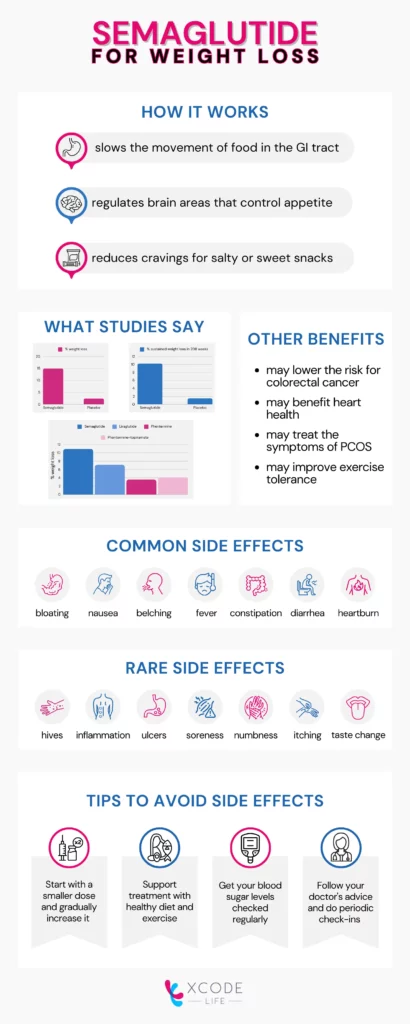A diabetes drug for weight loss? Semaglutide, also known by other brand names, is still making waves on the Internet even after years of FDA approval. In 2014, the FDA approved semaglutide (ozempic) for type 2 diabetes. But after clinical trails showed its promising effects on weight loss, in 2021, the FDA approved semaglutide (Wegovy), a once-weekly injection, for weight loss in adults when used in combination with a healthy diet and routine exercise. While these results are promising, delving into the potential side effects of semaglutide is essential.
Semaglutide And Its Uses
Semaglutide is a medication used mainly to treat type 2 diabetes and chronic weight management.
It is commonly marketed under the brand names Ozempic and Rybelsus for diabetes and Wegovy for weight management.
As a GLP-1 receptor agonist, semaglutide mimics the incretin hormone GLP-1, increasing insulin release, decreasing glucagon levels, and slowing gastric emptying.
These actions lower blood sugar levels and suppress appetite, aiding in weight loss.
Semaglutide is administered via an injection under the skin once a week.
Clinical trials have shown promising results in terms of blood sugar (HbA1C) reduction and supporting weight loss compared to other treatments.
The medication is generally well-tolerated, with common side effects, including nausea, vomiting, and diarrhea, which tend to decrease over time.
Semaglutide has also shown potential benefits for cardiovascular health, lowering the risk of major cardiovascular events in patients with type 2 diabetes.
Its dual role in managing blood sugar and supporting weight loss makes it a valuable option for individuals struggling with both conditions.
However, it should be used under medical supervision, especially considering potential side effects and underlying health conditions.
Semaglutide For Weight Loss
Semaglutide supports weight loss via the following mechanisms:
- Slowing movement of food through the gastrointestinal tract
- Regulating the areas of the brain that control satiety and appetite
- Reducing cravings for salt or sweet snacks
But these effects may not be permanent. For example, the appetite and craving reduction effects aren't seen once the medication is stopped.
Research Support and Efficacy
Numerous clinical trials have demonstrated the effectiveness of semaglutide for weight loss:
- Clinical Trials: In a pivotal study involving approximately 2,000 adults with obesity or overweight (without diabetes), those using semaglutide in conjunction with lifestyle modifications lost an average of 14.9% of their body weight over 68 weeks, compared to a mere 2.4% weight loss in the placebo group.
- Long-term Outcomes: Research indicates that semaglutide can lead to sustained weight loss over extended periods. For example, in the SELECT trial, participants maintained a mean weight reduction of around 10.2% after 208 weeks of treatment, significantly outperforming those on placebo.
- Comparative Efficacy: Semaglutide has shown superior weight loss results compared to other anti-obesity medications. For instance, it resulted in greater weight loss than liraglutide (another GLP-1 receptor agonist) and has been associated with weight loss levels comparable to those achieved through bariatric surgery.
- Real-world Effectiveness: Observational studies have also reported significant weight loss outcomes in patients using semaglutide, reflecting its effectiveness outside controlled trial settings
Common And Rare Semaglutide Side Effects
Semaglutide can have various side effects. While some are common and manageable, others are rare and may need medical attention.
Common side effects
- Belching
- Bloating and feeling of fullness
- Stomach pain
- Heartburn
- Passing gas
- Recurrent fever
- Yellow eyes or skin (jaundice)
- Constipation
- Hair loss
- Diarrhea
- Nausea
- Vomiting
Rare side effects:
- Heating sensation at the injection site
- Bleeding
- Blistering
- Discoloration of the skin
- Hives
- Infection
- Inflammation
- Itching
- Lumps
- Numbness
- Redness and rash
- Scarring
- Soreness
- Swelling
- Tingling
- Ulceration
- Change in or loss of taste
Does Semaglutide Make You Tired?
Fatigue is a common side effect associated with semaglutide use, especially during the initial stages of treatment.
Several factors can cause this tiredness:
- Appetite suppression: Semaglutide can suppress appetite, reduce calorie intake, and cause a temporary drop in energy levels.
- Gastrointestinal (GI) side effects: Other common side effects of semaglutide, such as nausea, diarrhea, and abdominal discomfort, can contribute to fatigue.
Does Semaglutide Cause Constipation?
Yes, semaglutide can cause gastrointestinal troubles, which include constipation as well.
A 2021 human study published on NCBI found that GI issues were more common with semaglutide 2.4 mg compared to a placebo.
Constipation was reported in 24.2% of people taking semaglutide, compared to 11.1% taking the placebo.
Other GI side effects, like nausea, diarrhea, and vomiting, were also more frequent but were usually mild to moderate.
These side effects typically resolved on their own and were most common during or just after dose increases.
Importantly, these GI side effects, including constipation, were mostly non-serious, and only a few people (4.3%) stopped treatment.
What Is The Biggest Side Effect Of Semaglutide?
The most commonly reported side effect of semaglutide is GI discomfort, which includes nausea, vomiting, and diarrhea.
This side effect can sometimes be severe, warranting discontinuing the medicine.
Long-term Side Effects Of Semaglutide For Weight Loss
Despite the advantages of semaglutide, being informed about the potential long-term side effects is crucial.
Here are some key long-term side effects associated with semaglutide:
- Gallbladder problems: Increased risk of gallstones and gallbladder inflammation, leading to abdominal pain, fever, nausea, and vomiting. Severe cases may require surgery.
- Pancreatitis: Rare but serious inflammation of the pancreas, causing severe abdominal pain and frequent vomiting.
- Gastroparesis (stomach paralysis): Delayed stomach emptying, causing prolonged nausea, vomiting, abdominal pain, bloating, and feelings of fullness. Higher risk for people with diabetes or those taking medications that slow digestion.
- Bowel obstruction: Some have reported blocked intestines, causing severe abdominal pain, nausea, and vomiting. This condition may require emergency surgery.
- Kidney problems: Risk of kidney injury due to dehydration from nausea, vomiting, and diarrhea. This condition is usually reversible with rehydration.
- Increased heart rate: Small increases in heart rate may be problematic for individuals with heart conditions such as atrial fibrillation or heart failure.
- Diabetic retinopathy: Potential worsening of diabetic retinopathy due to rapid blood sugar improvement in diabetic patients.
- Thyroid cancer: Possible risk of thyroid tumors based on rodent studies. People with a personal or family history of medullary cell carcinoma or multiple endocrine neoplasia syndrome type 2 (MEN2) should avoid semaglutide.
- Mental health: Rare reports of suicidal thoughts. Individuals with a history of depression should be closely monitored for any worsening symptoms or new mental health issues.
How Long Do Semaglutide Side Effects Last?
Semaglutide side effects are most noticeable when you first start taking the medication or after your dose is increased.
Like other medications, your body often needs time to adjust to the new treatment.
GI side effects are common during the initial weeks of treatment and usually improve over time.
However, individual experiences may vary. If you continue to experience severe or persistent side effects, consult your healthcare provider.
Is It Possible to Avoid Semaglutide Side Effects?
Managing the side effects of semaglutide involves several strategies, such as:
- Starting treatment with a smaller dose and gradually raising it can help your body adjust to the medication.
- Carefully follow your doctor's recommendations, including reading the medication guide and using semaglutide as prescribed.
- Eating smaller meals, avoiding fatty foods, and staying upright after eating may help alleviate nausea and vomiting.
- Incorporating lean proteins and fiber-rich foods into your diet can support overall well-being and reduce GI discomfort.
- Regular blood glucose checks and maintaining a consistent meal and exercise routine can improve treatment effectiveness.
- If you are pregnant or experience persistent or worsening side effects, consult your healthcare provider promptly.
When To Contact Your Doctor?
Contact your doctor if you have any health conditions or are taking medications, including over-the-counter drugs, vitamins, herbal products, or supplements.
Specifically, let them know if you have a history of pancreatitis, kidney problems, or diabetic retinopathy.
Also, discuss any concerns about low blood sugar and how to manage it.
Let your doctor know if you are pregnant, planning to become pregnant, or breastfeeding, as semaglutide's effects in these situations are not fully known.
Your doctor can guide you on whether semaglutide suits you and monitor potential interactions or side effects.
Summary: Side Effects Of Semaglutide For Weight Loss
- Semaglutide is a medication used to treat type 2 diabetes and manage weight. It is marketed as Ozempic, Rybelsus, and Wegovy.
- It mimics the GLP-1 hormone, helping to release insulin, reduce blood sugar levels, and facilitate weight loss.
- Nausea, vomiting, and diarrhea are commonly experienced side effects. Which usually decreases over time.
- Rare but severe side effects include digestive, kidney, and thyroid issues, hair loss, rapid heart rate, vision problems, and mental health concerns.
- Side effects are most noticeable initially but typically improve with time.
- Managing side effects involves starting with a lower dose, following dietary guidelines, and consulting your doctor for severe or ongoing issues.
Others Are Also Reading

DHEA For Weight Loss: How Does It Work

Combating The Yo-Yo Effect: Avoiding Weight Regain After A Diet

How It Works: Genetic Testing For Weight Loss
References
https://www.drugs.com/semaglutide.html
https://link.springer.com/article/10.1007/s40618-024-02309-2
https://www.uclahealth.org/news/article/semaglutide-weight-loss-what-you-need-know
https://www.ncbi.nlm.nih.gov/pmc/articles/PMC9293236
https://www.webmd.com/drugs/2/drug-174491/ozempic-subcutaneous/details
https://www.ncbi.nlm.nih.gov/pmc/articles/PMC8961394
https://www.ncbi.nlm.nih.gov/pmc/articles/PMC10874596
https://www.ncbi.nlm.nih.gov/pmc/articles/PMC3281535
https://www.ncbi.nlm.nih.gov/books/NBK603723
https://www.medicalnewstoday.com/articles/drugs-ozempic-side-effects







